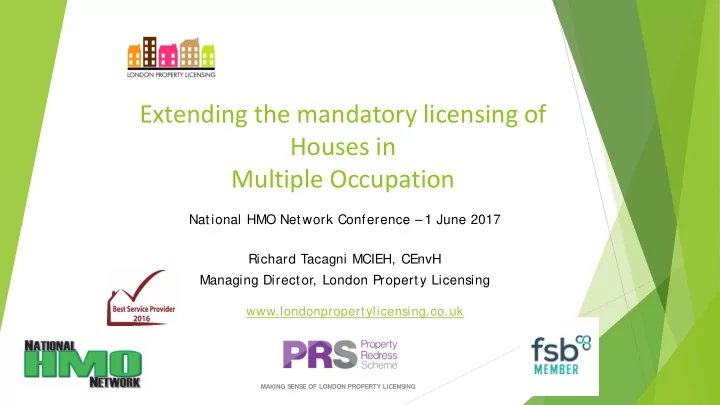

Extending the mandatory licensing of Houses in Multiple Occupation National HMO Network Conference – 1 June 2017 Richard Tacagni MCIEH, CEnvH Managing Director, London Property Licensing www.londonpropertylicensing.co.uk MAKING SENSE OF LONDON PROPERTY LICENSING
How did we get here… Immigration Speech, David Cameron, 21 May 2015: " We’ll also crack down on the unscrupulous landlords who cram houses full of illegal migrants, by introducing a new mandatory licensing regime. ” Government HMO licensing consultation, 6 November to 18 December 2015. Gavin Barwell, Housing & Planning Minister, 18 October 2016: intention to expand mandatory HMO licensing in 2017, subject to parliamentary approval. Government HMO licensing consultation, October 2016 to 13 December 2016. Still awaiting government response. Housing White Paper, 7 Feb 2017, confirms intention to widen the mandatory HMO licensing scheme. Possible implementation October 2017 – to be confirmed. MAKING SENSE OF LONDON PROPERTY LICENSING
Understanding the HMO licensing proposals Current definition (since 1 April 2006). Any property that: Is three or more storeys high (a storey includes a basement, loft conversion and any storey comprising business premises); Contains five or more people in two or more households; and Contains shared facilities such as a kitchen, bathroom or toilet. S implest approach to widen the scope of licensing would have been to remove the ‘ three or more storey’ criteria. If only the proposed changes were that simple… ... MAKING SENSE OF LONDON PROPERTY LICENSING
Understanding the HMO licensing proposals The changes under consideration will only apply in England. Current proposal: Any house (s254 standard or converted building test) or any self contained flat / maisonette in a converted building that: Contains five or more people in two or more households; and Contains shared facilities such as a kitchen, bathroom or toilet. Section 257 HMOs: certain converted blocks of flats will be excluded. The rules will be applied differently to self contained flats in purpose built blocks of flats. This is where it gets more complicated..... MAKING SENSE OF LONDON PROPERTY LICENSING
Application of licensing to purpose build blocks Most flats in multiple occupation within purpose built blocks will be exempt from mandatory HMO licensing, even if they contain five or more people. Purpose built blocks containing commercial or other non-residential premises Within scope of mandatory HMO licensing if residential accommodation comprises one or two self contained flats. Outside scope of mandatory HMO licensing if residential accommodation comprises three or more self contained flats. There is still time for government to fine-tune the proposals prior to implementation. MAKING SENSE OF LONDON PROPERTY LICENSING
Impact of the changes Currently estimated about 63,000 licensable HMOs in England, about two thirds of which have been licensed. Changes will bring an extra 174,000 properties within scope of licensing. Will be a grace period of six months to apply for a licence. Additional licensed HMOs will be passported into mandatory HMO licensing free of charge, where applicable. Transitionary arrangements from selective to mandatory HMO licensing not yet confirmed. Changes have resource implications for every local housing authority in England. MAKING SENSE OF LONDON PROPERTY LICENSING
Other matters under consideration Proposed new minimum bedroom size of 6.52m2 for 1 person and 10.23m2 for 2 people for properties with a mandatory HMO or additional licence. Criminal record checks (DBS or Disclosure Scotland) to accompany all licence applications. New mandatory refuse storage and disposal licence condition. Automatic licence fee discount for certain purpose built student accommodation blocks. MAKING SENSE OF LONDON PROPERTY LICENSING
Now is the time to prepare: for local authorities Develop a communications plan and promotional activity backed by clear 1. and simple information on the council’s website and a telephone advice line. A simple and user-friendly online application and payment system with 2. accompanying guidance. It will increase efficiency and drive down costs. Review the council’s HMO standards and fee schedules. 3. Avoid the temptation to impose excessive and over prescriptive licence 4. conditions, whilst making sure you include all the mandatory conditions. Adopt a light-touch approach for compliant landlords and keep routine 5. submission of documents to a minimum. Free up resources for risk based intelligence-led enforcement activity. MAKING SENSE OF LONDON PROPERTY LICENSING
Now is the time to prepare: landlords /agents Analyse your property portfolio and identify properties that will be brought 1. within the scope of licensing for the first time. Consider the resourcing implications. Start to compile all the necessary documentation – measured floorplan, gas 2. and electrical certificate, fire alarm / emergency lighting test certificate, etc. Check you have consent for HMO use from all interested parties – leaseholder, 3. freeholder, mortgage lender, etc. Examine your local council’s HMO standards and LACORS fire safety guidance 4. and identify any likely deficiencies with room sizes, facilities, fire precautions, etc. Think about who will be the proposed licence holder and designated manager. 5. MAKING SENSE OF LONDON PROPERTY LICENSING
Topic for debate: what are ‘adequate fire precautions’? Roll-out of additional HMO licensing schemes has seen the tendency to move from a risk based to a more prescriptive approach to fire precautions. For example, requiring emergency lighting and a full 30 minute protected escape route in a first floor flat let to four students on a single tenancy. Shared houses & flats verses bedsits – understanding the definition, risk profile and assessing appropriate fire precautions. Lack of consistency on the requirement for fire extinguishers. Understanding which HMOs require fire risk assessments and which HMOs do not. We need to strive for a balanced and proportionate approach to the regulation of licensed HMOs. MAKING SENSE OF LONDON PROPERTY LICENSING
Recommend
More recommend